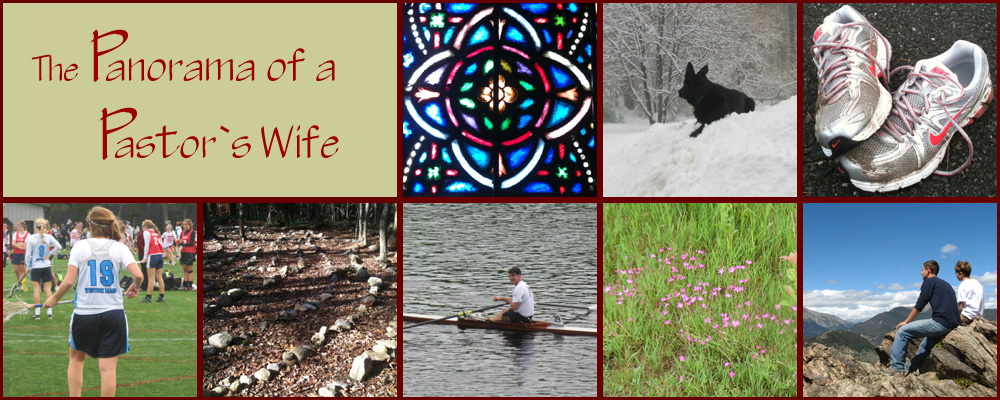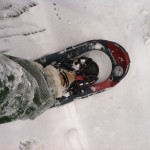Here we go, into the beating heart of the Christian calendar again. In observance of the first day of Lent yesterday, my husband once again participated in “Ashes to Go” in downtown Concord. Apparently it, or they, went quite well. The weather was practically balmy, and lots of people stopped by. I was reminded of human mortality too…just from a little distance away. At this time of year, I am also reminded of the fact that I didn’t grow up with these rituals as regular features of life, and I wonder how that makes me different, or lacking, or something.
This time, as we enter Lent—a time when people often give up something they enjoy—I fit right in, kind of, because I have given up looking for my snowshoe.
As if there aren’t enough reasons already to respect The Snow (with this latest weekend accumulation, it’s time now to let the word be elevated into something deserving of upper case) I have to give it credit for actually swallowing up something that was, I swear, pretty securely attached to my foot.
This has been both an odd and inconvenient loss, yes, but curiously enough, it has also provided some gain. I’ve had a kind of stepping off point, so to speak, into a pasture of pondering. What are the things, in addition to snowshoes of course, which actually help hold us up during the course of daily life? And are these things mostly in the “secular” or in the “religious” category?
Slight correction: I don’t really mean “hold us up” so much as “prevent us from sinking down.” It’s a little embarrassing to admit, but when I first tried snowshoes several years ago, I was kind of expecting them to allow me to glide right over the deep snow—to stay afloat on a sea of white. Friends and neighbors had been so enthusiastic about the experience, it sounded to me as if these things you strapped on worked to defy gravity. In fact, of course, they just made the falling through, or falling down, less; forward motion could retain the upper hand—or foot.
The disappearing happened several days ago; I had just arrived at the border of our property, taken a big step up into an enormous field, and then I could feel my foot was noticeably lighter. “No problem,” I thought, “the thing will be right here somewhere.” But it wasn’t. I used my pole to dig down, to scan really, the patch of trail I’d just emerged from, expecting a bit of black or red to greet me. Alas, there was nothing but endless white. I guess I wouldn’t do well as the main character in Jack London’s “To Build a Fire,” but the truth is I got tired of looking pretty quickly after my toes and fingers started objecting to the fruitlessness of the search.
enormous field, and then I could feel my foot was noticeably lighter. “No problem,” I thought, “the thing will be right here somewhere.” But it wasn’t. I used my pole to dig down, to scan really, the patch of trail I’d just emerged from, expecting a bit of black or red to greet me. Alas, there was nothing but endless white. I guess I wouldn’t do well as the main character in Jack London’s “To Build a Fire,” but the truth is I got tired of looking pretty quickly after my toes and fingers started objecting to the fruitlessness of the search.
Not surprisingly, since we’ve had yet more snow, the snowshoe hasn’t exactly popped up. My husband, understandably, was disappointed that I didn’t strive harder to find it right away…in that this is one of the main activities we share in winter. My confidence that 1) we can ski instead and 2) it will indeed turn up come spring seems, well, a little pale and unsatisfying. Then—I know this is a stretch— I got to thinking how maybe my laid back approach has something to do with my not really minding walking in regular old boots to begin with.
A couple of weeks ago, New York Times columnist David Brooks wrote a provocative column called “Building Better Secularists.” In it, he provides a kind of cautionary admonishment to people – like Phil Zuckerman, author of the very upbeat Living The Secular Life– who think that it’s easy as pie to be fully moral without religion. According to Brooks, setting up one’s own structure, one’s own code for goodness and doing right by others is very hard work because everything has to be invented and formulated from scratch. He says:
The point is that an age of mass secularization is an age in which millions of people have put unprecedented moral burdens upon themselves. People who don’t know how to take up these burdens don’t turn bad, but they drift. They suffer from a loss of meaning and an unconscious boredom with their own lives.
They drift? In that it’s not summer with all of us lolling around on rafts, we’re apparently right back to the snow again. Brooks must definitely be feeling the winter, too. Or maybe we’re back to me losing my snowshoe in the snow and finding that I no  longer had a way of going forward with minimal sinking. But wait, this seems a little harsh, don’t you think? I mean, I agree that people who don’t partake in regular religious observances can and should look within to identify their moral centers, to check on the health and strength of their convictions. They can also make certain that they are positively living them out by going beyond self and contributing to their communities and the larger society. But to assume that not worshipping in a congregation results in a “loss of meaning” and “boredom” is just plain wrong. All kinds of people become drifters, it seems to me, and I don’t think it has anything to do with whether they attend regular services or not. Besides, as my daughter was just saying this morning, do you really need to feel purpose-driven every single day? Frankly, that can get a little boring too. Having the ability to see and enjoy beauty, to withstand setbacks, to laugh, to connect with and serve others—- these things hold me up, so long as I manage to do them.
longer had a way of going forward with minimal sinking. But wait, this seems a little harsh, don’t you think? I mean, I agree that people who don’t partake in regular religious observances can and should look within to identify their moral centers, to check on the health and strength of their convictions. They can also make certain that they are positively living them out by going beyond self and contributing to their communities and the larger society. But to assume that not worshipping in a congregation results in a “loss of meaning” and “boredom” is just plain wrong. All kinds of people become drifters, it seems to me, and I don’t think it has anything to do with whether they attend regular services or not. Besides, as my daughter was just saying this morning, do you really need to feel purpose-driven every single day? Frankly, that can get a little boring too. Having the ability to see and enjoy beauty, to withstand setbacks, to laugh, to connect with and serve others—- these things hold me up, so long as I manage to do them.
Furthermore, I really don’t go along with the whole image of people on the secular side bearing “moral burdens” to begin with. Sounds so onerous. Unless I’m reading this wrong, Brooks seems to be saying that church-or-temple-or-mosque attending people are able to glide along, propelled by the engines of their respective faith communities. Really? Is it kind of like tapping into the town water supply versus building one’s own well? In any case, I think that, whichever side of the line we recognize ourselves to be on, we need to find a way through the snow that both relies on and preserves our strengths.
Strange as it may be to have snowshoes and Lent all mixed together in my mind, I also have Mother Goose coming into play with this refrain, “Ashes, ashes, we all fall down!” Let’s try to stay up as long as we can, anyway, enjoying the view.


